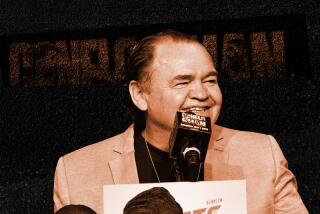Elder Trinidad Built a Career for Self and Son
- Share via
LAS VEGAS — The road home wasn’t easy for 18-year-old Felix Trinidad.
Felix Trinidad Sr., that is.
After laboring at a construction job in Condado, a suburb of San Juan, Puerto Rico, he would travel by foot, by bus and by van to reach the modest home in Cupey Alto he shared with his mother and seven brothers and sisters.
Today, at 52, Trinidad can only smile and marvel at how high he has climbed on the economic ladder. As manager and trainer of his son, Felix Jr., he negotiates with the financial giants of the boxing world and works his son’s corner against some of the sport’s toughest opponents.
Known as a give-no-quarter bargainer, Trinidad has not flinched in the face of either Don King, his promoter, or rival promoters, such as Bob Arum. He turns down offer after offer until he gets the purses he thinks his son, one of the top pound-for-pound fighters in the world, deserves.
The younger Trinidad, known as Tito in the Trinidad camp, will get $10 million to fight Winky Wright, who will get $4 million, Saturday at the MGM Grand Garden Arena.
Both Trinidads, and the rest of their camp, are spending the week in a two-story luxury suite atop the MGM Grand Hotel, the vista of the Las Vegas strip spread out before them.
The older Trinidad, known as Don Felix, directs not only the negotiations and the training regimen, but the leisure time as well. This week, he is running a pool tournament on a table in the suite.
Don Felix, who presents a stern face in public, is relaxed with a pool stick in his hands, teasing opponents and relishing the moments when his own shots are successful.
Which quite often are. Tito was eliminated early but Don Felix is going strong, heading into the final rounds.
Life certainly wasn’t that good for Felix when he was growing up in Cupey Alto. Nobody had a pool table. Still, there was always food on the table. His father, Dolores Trinidad Benitez, was foreman of a crew of 96 farm workers.
It all changed when Felix turned 11. His father died of liver cancer at 45, leaving Felix, youngest of the brood, and the rest to survive in the fields.
Felix did his part, did it so well that, at 14, he was summoned to the residence of Puerto Rican governor Roberto Sanchez Vilella and given a certificate naming him as the best young farm worker on the island.
“And,” Don Felix said through a translator, “they also gave me a fountain pen and $35.”
To Felix in those days, $35 meant more than $10 million means today.
Despite the honor, Felix saw beyond the fields to a better life. He just didn’t know what it might be. Sports? There were no facilities.
“We didn’t even have a baseball field near us,” he said.
At 16, Felix became a construction worker. Which led him to a fateful trip home from the job two years later.
It had begun like any other trip, Felix and his fellow workers walking and joking as they headed for the bus stop. Then they spotted Nelson LaSalle, a local fighter they had seen on television. Excited, they decided to follow him. When LaSalle disappeared inside the Mata Corona gym, they followed.
It was the beginning of a new world for Felix, one that would become his life.
Encouraged by trainer Johnny Toledo, Felix put on a pair of gloves and discovered love at first punch.
He was quickly locked into an arduous daily schedule. He would leave home at 6:30 in the morning, get to his construction job early and finish by noon, then head to the gym for a two- to three-hour workout. After dinner, he went jogging into the gathering darkness.
Soon, he was fighting as an amateur in the featherweight division. At 22, he turned pro, but his career lasted only 16 fights because of eye and neck injuries.
Even so, his biggest moments in the sport were yet to be. Tito would shadow box with Felix almost from the time the youngster could walk.
Today, with the Trinidads at the top of the boxing world, never a day passes that Don Felix doesn’t think of his father, his mother, Matilde, and those days of picking crops.
“They would be so proud of what we have achieved,” he said. “They would be happy to know the family they started has stepped into a much better place. I wish they had known the comfort we enjoy. They had such a tough life.”
More to Read
Go beyond the scoreboard
Get the latest on L.A.'s teams in the daily Sports Report newsletter.
You may occasionally receive promotional content from the Los Angeles Times.










